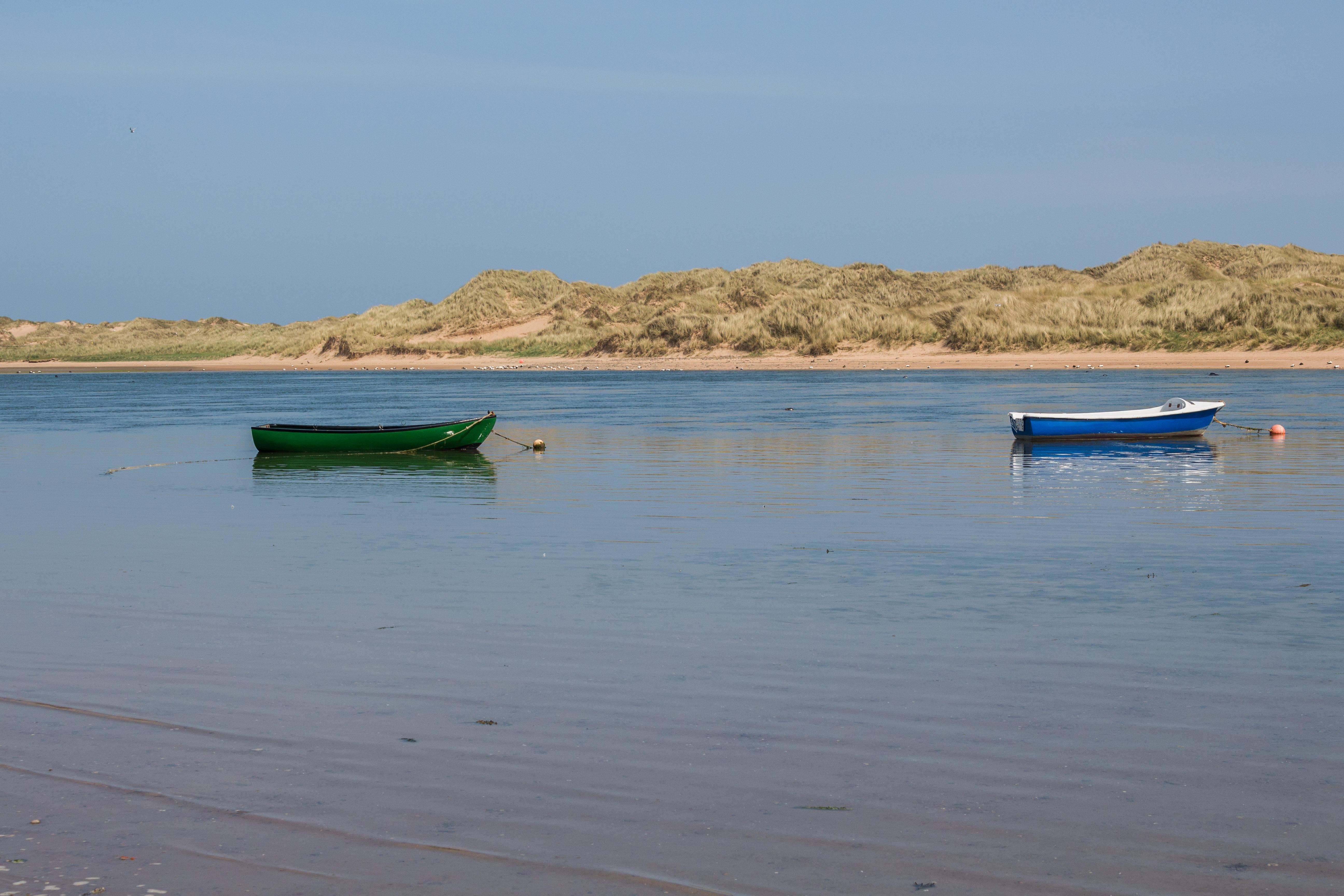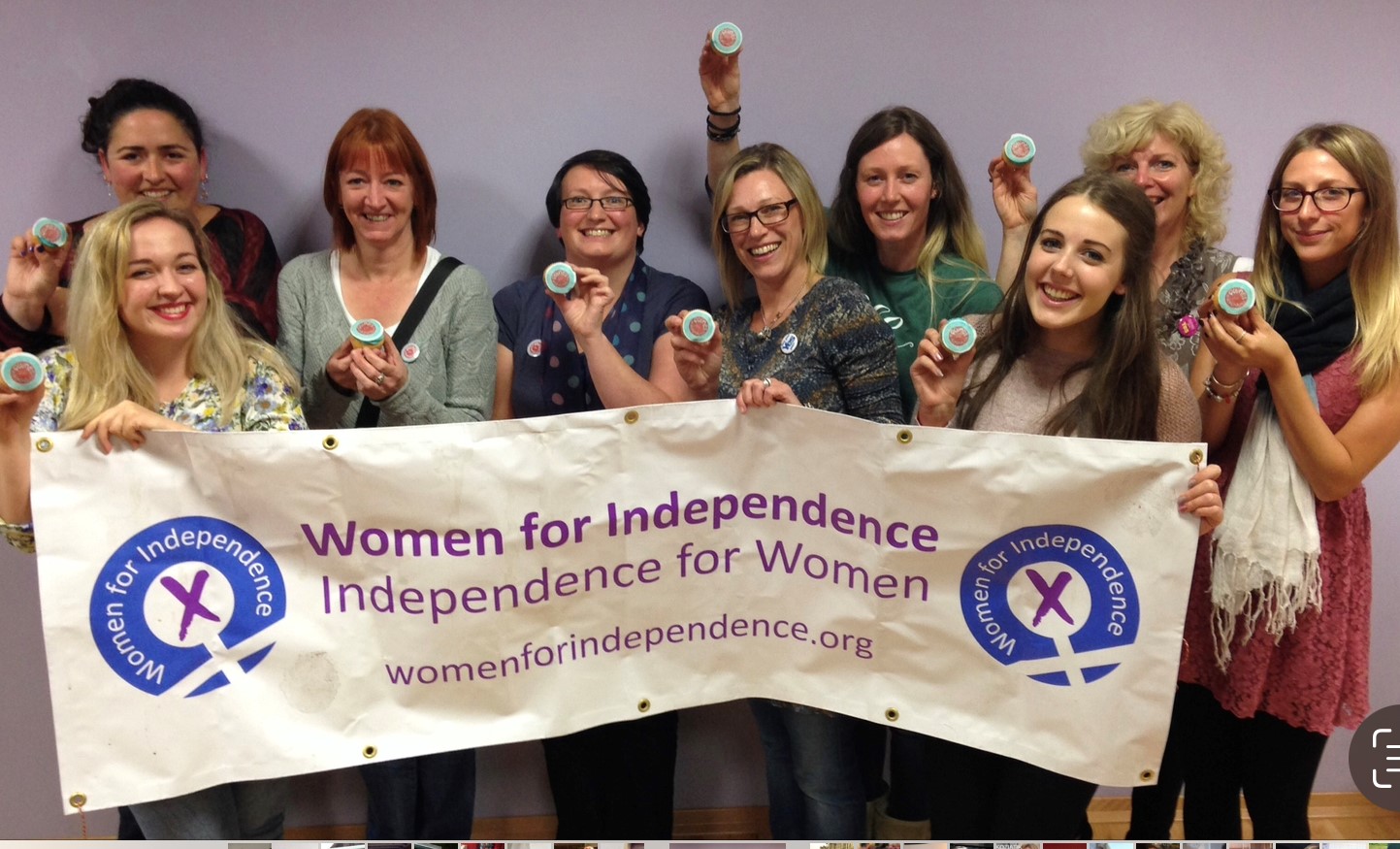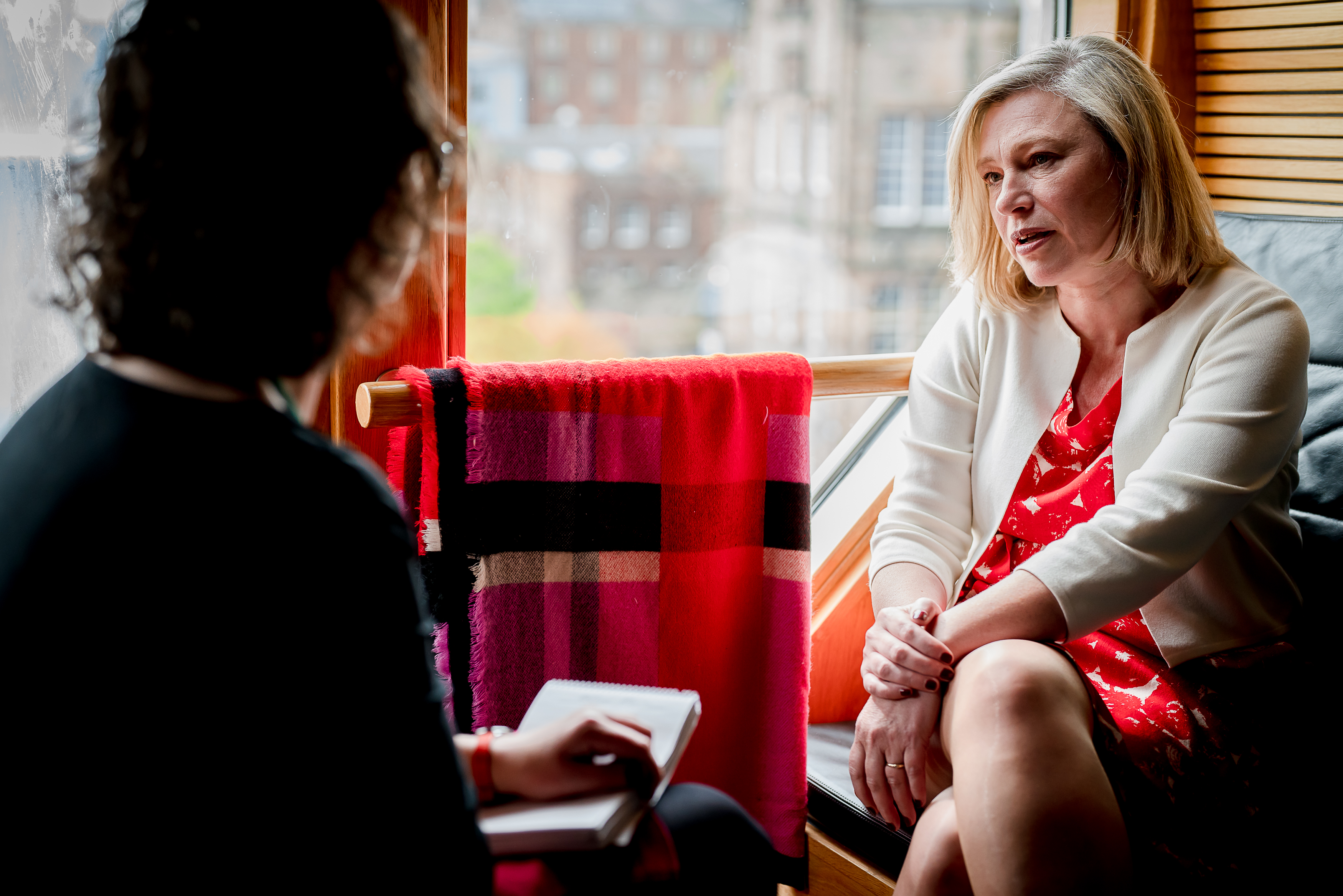Political journey: An interview with Gillian Martin
By rights, Gillian Martin should never have been an Aberdeenshire lass. The oldest of three children, her very early years were spent in Clydebank, where her entire extended family lived, but her parents were forced to move north after her father lost his job in the shipbuilding industry. Sensing that employment in the local area was going to become extremely hard to find, he decided to seek opportunities in the North Sea oil and gas sector instead.
“My mum and dad are not from Aberdeenshire and the reason I grew up there is because my dad worked in shipbuilding,” Martin says when we meet in the parliament at the end of April.
“They decided in the late 1970s, as John Brown’s shipyard was about to close, to make the move. They left the whole family behind – both sets of grandparents, everybody. I would have been about seven and it seemed huge at the time.”
The family made their home in Inverurie initially before settling in Newburgh, a pretty coastal village nestled between Aberdeen – the northern city that was at that time busy making its name as the oil capital of Europe – and St Fergus – an unassuming village that has become synonymous with the gas terminal that was established on its outskirts in the late 1970s. Martin has not moved far since, going from school in Ellon – the once-bustling town on the banks of the Ythan now famous for being home to controversial beer-maker BrewDog – to the University of Glasgow then back to Aberdeen and a job as a lecturer at North East Scotland College. She now lives in Newmachar with her teacher husband and two adult children, just a few miles from where her parents ultimately laid down their roots.
 Martin's family moved from Clydebank to Newburgh, a village on the Ythan estuary in Aberdeenshire
Martin's family moved from Clydebank to Newburgh, a village on the Ythan estuary in Aberdeenshire
Aberdeenshire has been kind to Martin’s family, with her father finding prosperity in an oil industry engineering role that saw him through to retirement and enabled him to support his wife and children in a way remaining in Clydebank would not have. But, having succeeded former first minister and one-time SNP grandee Alex Salmond as the MSP for Aberdeenshire East in 2016, Martin knows she represents the people of an area that is in flux. The oil industry, which has been in decline for decades, is now irrevocably winding down, with the urgency of the climate emergency meaning the public case for ongoing fossil fuel extraction is becoming ever harder to make. Transition is now the watchword and Aberdeen, as discussed in this feature, is well placed to lead the charge towards a clean energy mix. Given her family’s own experience, Martin says she feels personally compelled to make sure not only that it does but that the people of the area benefit.
“I personally feel so absolutely driven to make sure that my area and the people in my area have a just transition and that this change that we’re making in terms of energy supply and energy mix is one that brings as many people that work in oil and gas with it as possible. It feels very personal to me,” she says.
“When my dad moved us it was to work offshore but a lot of his friends didn’t make that move and a lot of them never worked again. Clydebank was a changed place – there wasn’t a just transition for Clydebank or for heavy industry. I saw what happened to my parents’ community and to people my mum and dad knew. A lot never worked again because the guts were taken out of Clydebank.
“I look back and think what my dad did was really brave and sensible, but it must have been a wrench. Fifty years on there is the prospect that the same might happen again in the area we moved to if we don’t get this right. I live in fear of that happening in my area.
"The oil and gas industry saved my family’s fortunes – my father had a great career as a planning engineer and my family had a great life because of it. There are all these people still working in it that need to see a future, not just in oil and gas but also if they want to move [into new jobs] and be part of the solutions to the climate emergency. They need to know that there’s going to be a future for them, either to transition out of oil and gas or for the younger generation to know there’s a future in the North East.”
Having run a company that produced videos for the oil and gas sector as well as serving as a college lecturer, Martin is clearly steeped in the North East and the industry that has come to define it. Indeed, it was her deep immersion in the area and its concerns that led her into politics in the first place. In the run up to the 2014 independence referendum the group behind the nascent political organisation Women for Independence was looking for a North East representative; Martin had an online blog in which she wrote about her own life and made a number of political observations and, having read it, the group asked her to come on board as a founding member. It was that that set her on the path to Holyrood.

“Women for Independence didn’t have anybody in the North East and because I was talking about politics online and had a bit of a profile because of the writing that I did they got in touch and asked if I wanted to start getting women together in the North East,” Martin recalls.
“I was an SNP voter and came from an SNP family but I wasn’t in the party – I didn’t join because I occasionally did some journalism and I didn’t want to have a party membership. I became a member at 4am on September 19th 2014. I came home from the count and thought ‘I need to start taking this seriously’. There were a few times during the campaign when my finger hovered over the join button but it was actually helpful not to be a member. I’d be in situations where people would say ‘well you would say that, you’re in the SNP’, but I could say I was there to represent independence, all parties and no party. After the count I thought ‘I need to get stuck in because this ain’t over’.”
Though she stresses she “didn’t become a member to become an elected member”, Martin says that when she attended an event just after the referendum, Maureen Watt, at that time the representative for Aberdeen South and North Kincardine, “purposefully strode across the room and said ‘right, let’s get you a candidacy’”.
“I never in my whole life thought I’d be involved in politics,” Martin says. “I was very political and loved a political argument, loved being involved in campaigns like the Trump golf course and Union Street Gardens, but I never in a million years thought of putting myself forward. Even when she said that I was saying no. Then I thought, ‘I’ve just spent the last two years girning about how there aren’t enough women in politics and how women’s issues aren’t represented’. I felt I’d be a hypocrite if I didn’t stand. I thought I should put my money where my mouth is.”
She stood, unsuccessfully, for Westminster in 2015 then won her Holyrood seat in 2016. Like other women who were drawn into politics as a result of the referendum – think community safety minister Ash Regan and public health minister Maree Todd – Martin’s rise through the ranks was swift. Just four years after her political awakening and two years after entering Holyrood she got the call some politicians go a lifetime without receiving.
“There was a feeling there was going to be a reshuffle and my phone rang with a withheld number – would I like to come to Bute House, the first minister wants to see me,” she recounts. “I wondered what I would be offered but, being a former further education lecturer, hoped it would be further and higher education. When [Nicola Sturgeon] offered that to me I felt so excited about what I could do in that brief.”
But then, just as quickly as everything had fallen into place, it all fell apart. Though her online presence had led Martin to Women for Independence and on into a political career, ultimately it was her history of writing a blog that killed off her political ambitions. A 2007 post in which she had referred to transgender students as “hairy-knuckled, lipstick-wearing transitional laydees” had come to light along with other entries she’d made about disabled students, black people and Jews. Her new position was deemed untenable and, with her parents preparing to make the journey to Edinburgh to see her installed, the promotion was cancelled.
Aside from making the necessary apologies, Martin has never spoken publicly about that moment in 2018 when Nicola Sturgeon asked her to take on a ministerial brief only for the offer to be immediately rescinded. When we discuss the matter in her Holyrood office Martin, who says writing the blog in the first place had been a way of helping her deal with the mental-health issues she and other members of her family experience from time to time, becomes emotional, but controls it because she feels it is important others learn from what she went through. She knows what she wrote was unacceptable – she cannot even bring herself to say the words she was exposed for using – and that the withdrawal of the job offer was entirely justified, but she wants something positive to come out of her experience.

“I’d been writing online for years before – I started writing to make my family and friends laugh,” she says. “It documented stories from my life, my family. It was always humour based and I started it because I suffer from bouts of depression and found it was good for my wellbeing. As I kept doing it, it got more and more and more popular and I started getting stuff published – in Australian Cosmopolitan, in other women’s magazines, in books.
“When I became a candidate I took it down, not because I was embarrassed but because there was a lot of personal stuff in it from when my kids were small. But you can’t ever take anything down from the internet. Stuff I had written came up when I was a candidate so I thought I’d been pre-disastered. No one ever took offence when I was writing it but of course you go from that world, being a private citizen, to being a politician and it’s a completely different ball game.
“The morning after I’d been asked to be a minister it surfaced. I think a journalist had used the Wayback Machine [a digital archive that preserves copies of disused websites]. That might have been months before but it was ready to go, the quotes were ready to go, the stuff to embarrass the government, to embarrass me, to embarrass the first minister and to make me feel horrible about myself was ready to go.
“I was embarrassed, and I was embarrassed that my colleagues had been made ministers and this was overshadowing that but the worst aspect of this was my family seeing me painted as something in the press. It wasn’t about losing a job or not being a minister but that my daughter had to go to school the next day. She was 15 at the time and I had to go home and chat with her about what would happen if anyone said anything about the front page of the Daily Mail. My family were all upset.”
It was clearly a chastening experience and one that Martin still shudders to think back on. Having past transgressions pointed out is one thing – the embarrassment and humiliation is hard to deal with – but having them pointed out so publicly and, by extension, so unforgettably takes it to a whole other level.
“I did not have a great summer and for some people I will always be the person who said X,” she says. “Obviously I was embarrassed and had not a great few weeks afterwards but it’s not so much that, it’s when [things come up] when you don’t expect it. My daughter went back to school after the summer and the FMQs where it was discussed her modern studies teacher put on by mistake. She got really upset and her friends got really upset and then when it was pointed out to the teacher she got really upset.
“You’ve got to put it into perspective, though, because the main thing is you know who you are and the people who know you know who you are. I had so many messages of support afterwards, not just from my colleagues, who were amazing, but cross-party too. They were really kind to me.”
Though she didn’t end up with the job she was hoping for, Martin still received a promotion of sorts when, in September 2018, she was asked to convene the Environment, Climate Change and Land Reform Committee. “I got to convene the committee that took forward the Climate Change Act,” she says. “I got to represent that committee at the Arctic Circle Conference twice and I also got to delve into an area of work that was amazing with climate change and the environment.”
Martin couldn’t shake off the feeling of how easily her life had been turned upside down by something she’d posted online years before, though, and she decided to put both that and her past experience of working in video production to good use to ensure the younger generation don’t get similarly caught out.
“I felt strongly about how I could do some work around protecting young people from their social media life,” she says. “I did a piece of work with my old college about the problem of sharing too much on the internet, not so much about what people were saying but the photos they were posting that would destroy their lives if they ever came up. I worked with my old colleagues and students on a campaign called Be Share Aware. We made two videos and one has been viewed a million times.
“I didn’t overtly want to go out and talk about what happened to me because who cares? I’ve made the most of my lot since then but I did want to do something that helped young people and the people who work with young people to focus on the dangers of their internet footprint, which I really, really worry about for young people who have grown up with social media. Will we get to a point where people will never be able to get into politics or a certain job because someone has delved into what they said years ago? If it can happen to me, a woman at the time in her late 40s, who moved into a new world and her old world came crashing in and caused a very embarrassing moment for me and my family and colleagues, then I want to do something with it.”
Though the humiliation is still raw and Martin clearly regrets the fuss the situation caused, there is a sense that in some ways the experience has been beneficial to her. Not only has it enabled her to channel something negative into positivity, but it has also allowed her to regain some of the self she lost when she left her creative life to move into politics.
“It was the steepest of learning curves,” she says, of the change from college lecturer and independent video producer to politician that happened overnight in May 2016. “Coming from quite a creative background, being involved in a lot of video work and teaching students how to make TV programmes – and I was also involved in the arts and crafts scene – to all of a sudden being in the public eye in a political sense, it had advantages but also disadvantages. [Politics] is a completely different place with completely different expectations and it was a difficult transition to make. I guess I don’t have much of an outlet for creativity any more, which I do miss to a certain extent. It’s a great job – I love it, though it’s all-consuming, but there are certain aspects of my being that I had to shelve in order to do the job justice and get stuck in.”
Holyrood Newsletters
Holyrood provides comprehensive coverage of Scottish politics, offering award-winning reporting and analysis: Subscribe